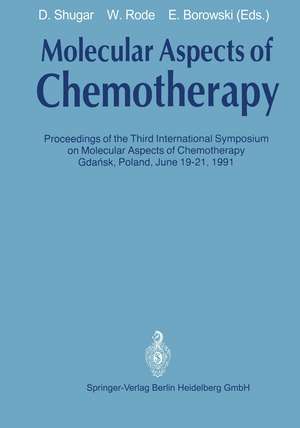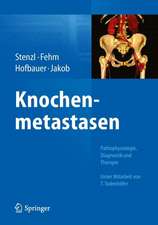Molecular Aspects of Chemotherapy: Proceedings of the Third International Symposium on Molecular Aspects of Chemotherapy Gdańsk, Poland June 19–21, 1991
Editat de David Shugar, Wojciech Rode, Edward Borowskien Limba Engleză Paperback – 13 dec 2012
Preț: 390.08 lei
Nou
Puncte Express: 585
Preț estimativ în valută:
74.65€ • 77.46$ • 62.39£
74.65€ • 77.46$ • 62.39£
Carte tipărită la comandă
Livrare economică 17-31 martie
Preluare comenzi: 021 569.72.76
Specificații
ISBN-13: 9783662027424
ISBN-10: 3662027429
Pagini: 288
Ilustrații: VIII, 279 p. 110 illus.
Dimensiuni: 170 x 242 x 15 mm
Greutate: 0.46 kg
Ediția:Softcover reprint of the original 1st ed. 1992
Editura: Springer Berlin, Heidelberg
Colecția Springer
Locul publicării:Berlin, Heidelberg, Germany
ISBN-10: 3662027429
Pagini: 288
Ilustrații: VIII, 279 p. 110 illus.
Dimensiuni: 170 x 242 x 15 mm
Greutate: 0.46 kg
Ediția:Softcover reprint of the original 1st ed. 1992
Editura: Springer Berlin, Heidelberg
Colecția Springer
Locul publicării:Berlin, Heidelberg, Germany
Public țintă
ResearchDescriere
While serendipity and random screening continue to fulfil a significant role in the search for new drugs, current remarkable advances in molecular biology and genetics are dictating to a profound extent the approaches employed in their development. Increasing attention is being devoted to investigations of the mechanisms of action of existing drugs, and the sources of undesired side effects, at the molecular level. The information so derived is now extensively applied, with the aid of broad inter disciplinary approaches, both theoretical and experimental, to improvements in existing drugs, and the rational design of new ones. The foregoing comprised the subject matter of the 3rd Inter national Symposium on "Molecular Aspects of Chemotherapy", under the auspices of the International Society of Chemotherapy, and organized by the Committee on Drug Research, Polish Academy of Sciences, and the Department of Biotechnology and Biochemistry, Technical University of Gdansk. This volume includes the texts of the review lectures presented by invited participants on up-to-date achievements, and future perspectives, in molecular mechanisms of inhibition of cellular functions and metabolism, with emphasis on the design and mechanisms of action of chemotherapeutic agents for treatment of bacterial, neoplastic, viral and parasitic diseases. From the Contents, it will be seen that the range of disciplines represented was a broad one, including theoretical and experimental chemists, physicists, molecular biologists, biochemists, enzymologists, virologists, tumour biologists. Plenary sessions were supple mented by several poster sessions.
Cuprins
Insight into Lactam Antibiotics and their Receptors from Computational Chemistry.- New Methods in Molecular Shape Analysis to Identify and Characterize Active Conformations.- Molecular Mechanisms for the Sequence Recognition of DNA by (+)-CC-1065.- A Common Structural Pattern Among Many Biologically Active Compounds of Both Natural and Synthetic Origin — A Novel Approach to the Design of Antineoplastic Agents.- Cyclic Nucleotide Metabolism as a Target in Chemotherapy.- Resistance to Anthracycline in Multidrug Resistant Cells. Role of the Membrane Transport.- Tumor Necrosis Factor: Mechanism of Action and its Potential for Anticancer Therapy.- Exploitation of Peptide Transport Systems in the Design of Antimicrobial Agents.- Inhibitors of 2,3-Oxidosqualene-Lanosterol Cyclase as Antifungal Agents.- The Use of the 3-Dimensional Structures of Rhinoviruses in the Design of Antiviral Agents.- Design of Virus-Specific Inhibitors of Terminal Glycosylation Enhancing the Antigenicity of Viral Glycoproteins.- Comparison of Crystal Structures of Inhibitor Complexes of the Human Immunodeficiency Virus Protease.- Anti-HIV Agents Interfering with the Viral gp 120-Cellular CD4 Interaction.- Polyionic Compounds Selectively Alter Availability of CD4 Receptors for HIV Coat Protein rgp 120.- Penciclovir and Famciclovir, Selective Anti-Herpesvirus Agents.- 2?3?Dideoxy-3’Thiacytidine (SddC) as an Anti-Human Hepatitis B Virus (HBV) and Anti-Human Immunodeficiency Virus (HIV) Agent.- Phosphorylating Enzymes Involved in Activation of Chemotherapeutic Nucleosides and Nucleotides.

















